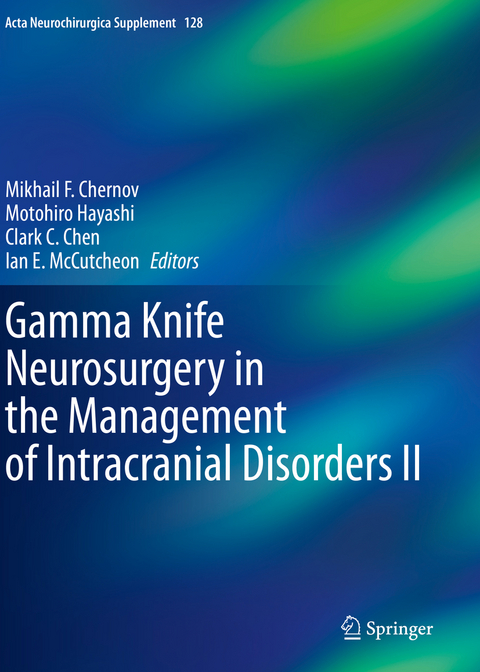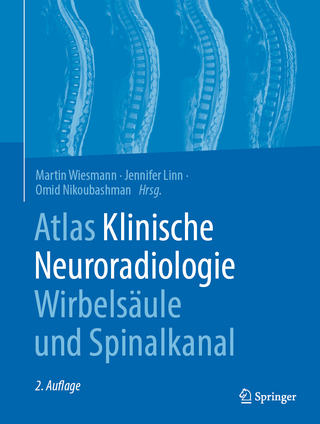
Gamma Knife Neurosurgery in the Management of Intracranial Disorders II
Springer International Publishing (Verlag)
978-3-030-69219-3 (ISBN)
The articles in this volume cover the various radiosurgical techniques used to treat benign and malignant intracranial tumors, cavernous malformations, and functional disorders, as well as a wide array of specific details on medical physics, neuroimaging, and anesthetic support. Particular emphasis is put on the optimal combination of microneurosurgery and radiosurgery for attaining the best functional results in patients with vestibular schwannomas, craniopharyngiomas, and pituitary adenomas, and on the most effective methods of treatment planning and radiation dosimetry in cases of metastatic brain tumors. The highlighted clinical aspects include indications for radiosurgery and the prediction of patients' prognosis, along with analysis of outcomes in comparison with results achieved by other modalities in the context of multifaceted therapeutic strategies. In addition, possible options for applying advanced treatment using such modern devices as Leksell Gamma Knife PerfexionTM and IconTM are presented in depth. This information will interest both radiosurgical practitioners and neurosurgeons, and help them to provide optimal care and to achieve the greatest benefit of their patients. This book will serve as an excellent companion for the previous publication "Gamma Knife Neurosurgery in the Management of Intracranial Disorders" (Acta Neurochirurgica Supplement, Volume 116, Springer, 2013).
lt;p>Dr. Mikhail Chernov completed his medical education (The First Leningrad Pavlov Medical University, 1989) and neurosurgical training (Russian Polenov Neurosurgical Institute, 1995) in St. Petersburg, Russia. In 2000 he became a clinical and research fellow in the Department of Neurosurgery of the Tokyo Women's Medical University, and in 2006 obtained a Doctor of Medical Sciences degree and became assistant professor in the Faculty of Advanced Techno-Surgery of the same institution. He has written over 140 scientific papers, served as editor-in-chief of several books, including Acta Neurochirurgica Supplement Volume 116 "Gamma Knife Neurosurgery in the Management of Intracranial Gliomas" (Springer, 2013), and as Executive Director of the Asian Gamma Knife Academy, member of the WFNS Radiosurgery Sub-Committee, ex officio board member of the International Stereotactic Radiosurgery Society, and chairman of its Education Committee.
Dr. Motohiro Hayashi graduated from the School of Medicine, Gunma University in 1991. Thereafter, he started neurosurgical training in the Department of Neurosurgery of the Tokyo Women's Medical University (TWMU). Between 1999 and 2001, he visited Timone University Hospital (Marseille, France), obtained the official French neurosurgical diploma (D'AFSA de Neurochirurgie), and completed training in stereotactic radiosurgery. In 2002, he returned to the same department of TWMU, and has become clinical and research assistant professor (2006), and subsequently assistant professor and director of the Gamma Knife Unit. His experience includes >10,600 cases of Gamma Knife surgery. He has published over 200 papers on stereotactic radiosurgery, and given over 350 conference presentations. He is the founder of the Asian Gamma Knife Training Program (currently, Asian Gamma Knife Academy), and has also been a member of the WFNS Radiosurgery Sub-Committee, former board member of the International Stereotactic Radiosurgery Society (ISRS), and president of the 12th ISRS Congress held in Yokohama, Japan.
Dr. Clark C. Chen completed his neurosurgery training at the Massachusetts General Hospital in 2008. He pursued clinical fellowships in radiosurgery and stereotactic neurosurgery before becoming the Director of Surgical Neuro-Oncology at the Beth Israel Deaconess Medical Center and assistant professor at the Harvard Medical School. In 2011, he moved to the Department of Neurosurgery, University of California-San Diego, where he rose to the rank of Professor and served as vice-chair of academic affairs. Since 2017, Dr. Chen has held the Lyle French Chair in Neurosurgery at the University of Minnesota. He specializes in treating brain cancers, with focus on minimally invasive surgery. Dr. Chen is an NIH-funded investigator active in national and international neurosurgery as a member of the Executive Committee of the American Association of Neurological Surgeons and of the Joint Tumor Section. He is an editor and reviewer for 20 journals that span the fields of radiosurgery, neurosurgery, clinical medicine, and laboratory research.
Dr. Ian E. McCutcheon received his MD from McGill in 1984. He trained in neurosurgery at the Montreal Neurological Institute and pursued a medical staff fellowship at the NIH (1987-1989). In 1991 he joined the Department of Neurosurgery at the University of Texas M D Anderson Cancer Center, where he remains today as professor of neurosurgery and holds a prestigious Ashbel Smith professorship. His research has focused on the biology of meningiomas and malignant peripheral nerve sheath tumors, and he maintains a parallel interest in neurofibromatosis, von Hippel-Lindau disease, and tumors of the brain and spinal cord. He has published widely (170 papers, 35 book chapters) on neurosurgical oncology, has edited four books, and serves on editorial boards including the <
Sponsors List.- Dedications.- 1. Subtotal Resection Followed by Adjuvant Radiosurgery for Large Vestibular Schwannomas: Outcomes with Regard to Timing and Regimen of Irradiation.- 2. Preplanned Partial Surgical Removal Followed by Low-dose Gamma Knife Radiosurgery for Large Vestibular Schwannomas.- 3. Outcome after Resection of Craniopharyngiomas with Regard to Original Surgical Grading System and Important Role of Stereotactic Radiosurgery in Their Management.- 4. Gamma Knife Radiosurgery of Pituitary Adenomas Invading the Cavernous Sinus: Tokyo Women's Medical University Experience.- 5. Stereotactic Radiosurgery for Pituitary Carcinoma.- 6. Evidence-Based Recommendations for Seizure Prophylaxis in Patients with Brain Metastases Undergoing Stereotactic Radiosurgery.- 7. Cumulative Intracranial Tumor Volume as Prognostic Factor for Patients with Brain Metastases Undergoing Stereotactic Radiosurgery.- 8. Treatment Options for Leptomeningeal Metastases of Solid Cancers: Literature Reviewand Personal Experience.- 9. Stereotactic Radiosurgery to Prevent Local Recurrence of Brain Metastasis after Surgery: Neoadjuvant vs. Adjuvant?.- 10. Redistributing Central Target Dose Hot Spots for Hypofractionated Radiosurgery of Large Brain Tumors: A Proof-of-Principle Study.- 11. Possible Overcoming Tumor Hypoxia with Adaptive Hypofractionated Radiosurgery of Large Brain Metastases: A Biological Modeling Study.- 12. Differentiating Radiation-Induced Necrosis from Tumor Progression after Stereotactic Radiosurgery of Brain Metastases using Evaluation of Blood Flow with Arterial Spin Labelling (ASL): The Importance of Setting a Baseline.- 13. Gamma Knife Radiosurgery for Symptomatic Cavernous Malformations: Tokyo Women's Medical University Experience.- 14. Gamma Knife Thalamotomy for Medically Refractory Tremor: Longitudinal Evaluation of Clinical Effects and MRI Response Patterns.- 15. Pituitary Radiosurgery for Management of Intractable Pain: Tokyo Women's Medical University Experience and Literature Review.- 16. Feasibility and Significance of Dose Adaptation via Linear Couch Translations to Correct for Rotational Shifts during Frameless Brain Radiosurgery with Gamma Knife Icon(TM).- 17. Impact of the Skull Size on Normal Brain Radiation Dose during Gamma Knife Radiosurgery: Results of a Pilot Study.- 18. Respiratory Monitoring during Gamma Knife Radiosurgery: Anesthesiological Aspects.- 19. The Proud History of Psychosurgery in the United States.- Author Index.- Subject Index.
"The greatest strengths of this book are the diversity of topics and the fact that the articles are clinical studies that were reviewed, edited, and selected for publication. ... they provide an excellent introduction into the use of GKS." (Ann Liu, Neurosurgery, Vol. 90 (2), February, 2022)
"The book can be read from cover to cover and also serve as a valuable reference for specific topics. With 27 black and white illustrations and 31 illustrations in color, the work and its encompassed topics are well depicted. ... There are well-delineated sections within the body of individual chapters. ... It is an excellent resource for those trainees in and practitioners of radiosurgery." (Jason Sheehan, World Neurosurgery, October 13, 2021)| Erscheinungsdatum | 04.07.2022 |
|---|---|
| Reihe/Serie | Acta Neurochirurgica Supplement |
| Zusatzinfo | XII, 174 p. 58 illus., 31 illus. in color. |
| Verlagsort | Cham |
| Sprache | englisch |
| Maße | 210 x 279 mm |
| Gewicht | 476 g |
| Themenwelt | Medizinische Fachgebiete ► Chirurgie ► Neurochirurgie |
| Schlagworte | Brain Tumor Management • Combined Treatment of Vestibular Schwannomas • Functional Radiosurgery • Management of Brain Metastases • stereotactic radiosurgery |
| ISBN-10 | 3-030-69219-1 / 3030692191 |
| ISBN-13 | 978-3-030-69219-3 / 9783030692193 |
| Zustand | Neuware |
| Informationen gemäß Produktsicherheitsverordnung (GPSR) | |
| Haben Sie eine Frage zum Produkt? |
aus dem Bereich


